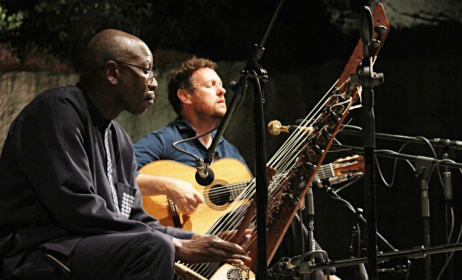Zim: Nhimbe Trust launches Ndebele folk music project
Nhimbe Trust in Zimbabwe launched a new project in the city of Bulawayo on 21 March to record Ndebele traditional folk songs that resonate with the global call to action on climate change.
 Musicians during a recording session in Bulawayo on 21 March.
Musicians during a recording session in Bulawayo on 21 March.
The project, which is envisaged to preserve and promote African traditional folk music, will materialise in an album courtesy of Nhimbe Trust’s Ilima Records. It will feature collaborations between upcoming artists and established musicians, including Mokoomba, Sam Mataure, Hudson Simbarashe, and Sarungano & The Story Tellers Band. It forms part of the implementation of the UNESCO Culture 2030 Indicators in Zimbabwe.
“We are working with some of Zimbabwe’s finest artists from Bulawayo and Harare and the album will be unveiled at a launch on a date to be confirmed,” Nhimbe Trust executive director Josh Nyapimbi told Music In Africa. “These are traditional Ndebele classic songs. We have deliberately chosen songs that speak to the current global discourse around climate change. We are going to take this work across the world. This is the first initiative by Ilima Records, whose essence is to preserve and promote folk music on the continent.”
The recording and production of the album, which is still underway, began with a workshop on 21 March with the support of UNESCO and Zimbabwe’s Ministry of Sports, Recreation, Arts and Culture. The workshop was also made possible by the Swedish International Development Cooperation Agency.
The broader project is a result of a memorandum of understanding signed between the city of Bulawayo and UNESCO in July last year. Plans are afoot to measure and monitor the contributions of culture towards the implementation of the UN’s Sustainable Development Goals (SDGs) in Zimbabwe.
“As it stands, there’s a general lack of statistical information on what culture is contributing to the nation,” Ministry of Sports, Recreation, Arts and Culture director Biggie Samwanda said. “When we get that data after the survey, it will assist in our planning. This talks to the SDGs that the government is trying to fulfil in relation to UNESCO. Through this process, we are attaining Vision 2030 and even beyond.”
He said the framework would assess culture’s contribution to policy and its role as a sector of activity. “Once we get this data as our policymaking tool, planning the allocation of resources to where they are needed will improve,” Samwanda said.
UNESCO regional director for Southern Africa Ms Nisha said the project would add greatly to Zimbabwe’s developmental aims.
“This initiative will bring to focus what culture is, what heritage is and what are the returns in terms of helping to achieve its development goals. Culture is not highlighted often in development programmes and in development policy and planning. We will also interrogate what percentage of the current budget is going towards promoting the cultural and creative industries. We also need to look at the returns from those investments, for example how culture contributes to tourism revenue and employment creation,” she said.





























Comments
Log in or register to post comments